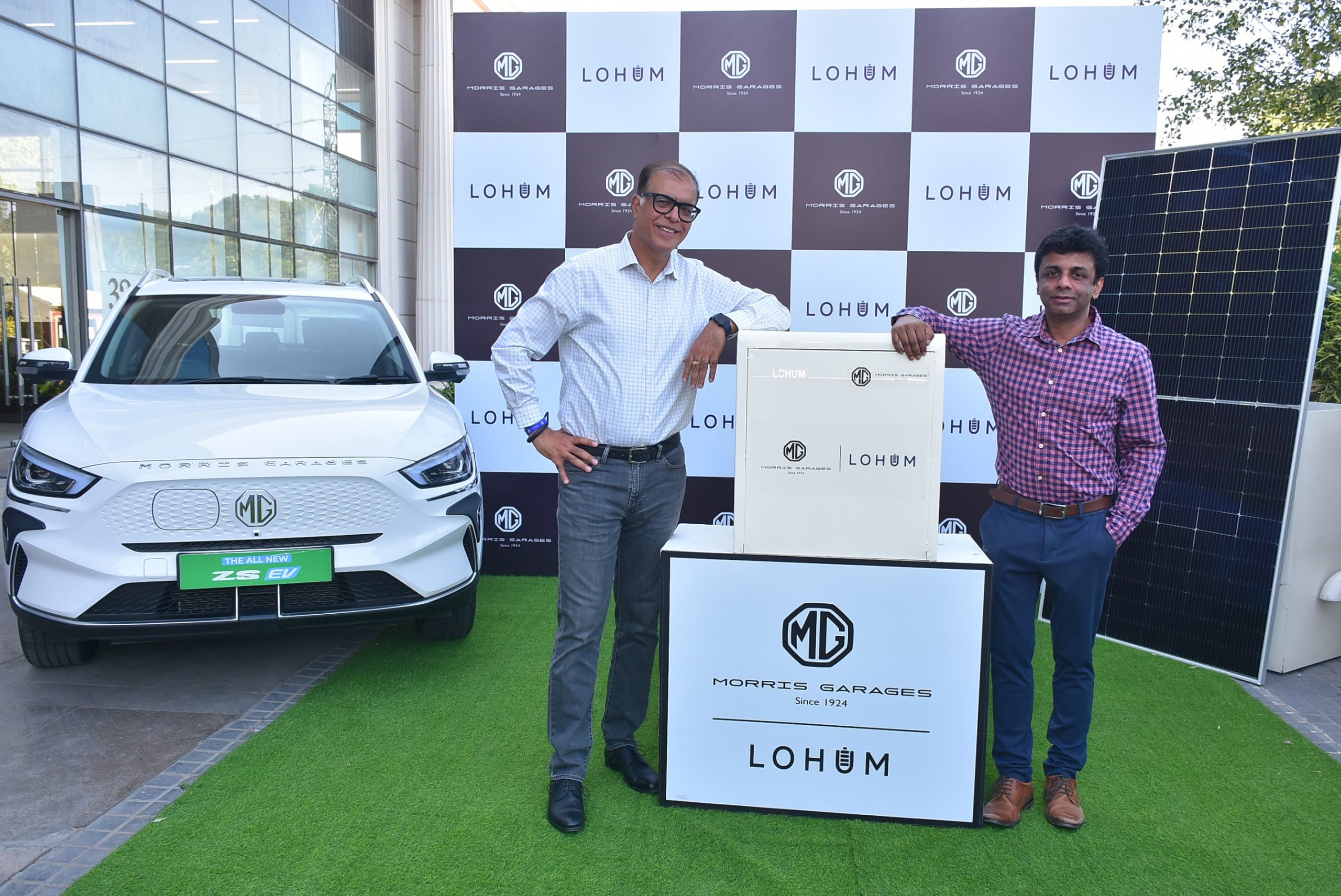- Launches first-of-its-kind project for 2nd life EV battery for a sustainable environment
- Introduces 5kWh Battery Energy Storage System (BESS) as first product
Gurugram, June 05, 2023: MG Motor India, a British automobile brand with a 99-year-old legacy, has joined forces with LOHUM, India’s largest producer of sustainable energy transition materials, to establish a comprehensive ecosystem for the reuse, and life cycle management of EV batteries. MG India and LOHUM partnership aims to develop the concept of second-life solutions for batteries, ensuring their efficient utilization and contributing to the circular economy. The project will harness the potential of used batteries by repurposing them as Battery Energy Storage Products (BESS), effectively extending their life cycle and optimizing resource usage.
Under the collaboration, LOHUM will reuse end-of-first-life batteries of MG electric vehicles to build sustainable 2nd-life Battery Energy Storage Systems (BESS) for a wide variety of clean energy applications in India’s urban and rural landscape. LOHUM’s proprietary repurposing technology will be used to maximize the potential of cells before recycling, utilizing healthy cells high on Remaining Useful Life (RUL) to build sustainable 2nd-life BESS for a wide variety of clean energy applications.
Rajeev Chaba, CEO Emeritus, MG Motor India, spoke on the partnership, stating, “At MG, we have always believed in fostering innovation and sustainability. Battery energy storage solutions (BESS) hold immense potential to revolutionize India’s energy landscape, with their versatile applications, affordability, and undeniable support for local communities. Through this India can unlock a future where clean, reliable, and low-cost energy storage becomes a reality, empowering communities, households, and entire rural areas alike while driving sustainable development and energy independence for the nation.
Chaba further added,” Our collaboration with LOHUM allows us to take a significant move forward in our commitment to sustainable mobility. By repurposing used batteries of our EV models, we not only extend their life cycle but also enable the delivery of power to essential community centres. The clear need of the hour is a safe, viable and enduring supply of clean energy, and this strategic partnership is a step towards the same.”
Rajat Verma, Founder & CEO of LOHUM, shared his perspective on the partnership, saying, “LOHUM is delighted to join hands with MG Motor India in this pioneering endeavour. Through our expertise in battery material recycling and low-carbon refining, we will play a pivotal role in ensuring the efficient utilization of MG’s EV batteries. By repurposing these batteries as BESS, we contribute to making the clean energy transition circular and address the critical need for reliable power supply in community centres. This collaboration represents a significant step towards sustainable development and underscores our commitment to creating a greener future.”
The initial offering under this partnership will be a 100% Off-Grid, 5kWh Battery Energy Storage System (BESS) to meet the essential energy needs of urban and rural India by solving the end-of-life EV battery problem and organizing the battery waste sector. The BESS will provide uninterrupted power supply even in regions with unreliable grid infrastructure.
By repurposing used MG EV batteries into second-life energy storage systems, MG Motor India and LOHUM are championing the principles of the circular economy. The circular economy model emphasizes the concept of reducing, reusing, and recycling resources to create a closed-loop system, minimizing waste and maximizing sustainability. Through this partnership, the batteries that would have otherwise been discarded are given a new purpose, contributing to a more efficient and responsible use of resources.
About MG Motor India
Founded in the UK in 1924, Morris Garages vehicles were world-famous for their sports cars, roadsters, and cabriolet series. MG vehicles were much sought after by many celebrities, including the British Prime Ministers and even the British Royal Family, for their styling, elegance, and spirited performance. The MG Car Club, set up in 1930 at Abingdon in the UK, has thousands of loyal fans, making it one of the world’s largest clubs for a car brand. MG has evolved into a modern, futuristic, and innovative brand over the last 99 years.
MG Motor India’s state-of-the-art manufacturing facility in Halol, Gujarat, has an annual production capacity of 1,20,000 vehicles and 3,000 employees. Driven by its vision of CASE (Connected, Autonomous, Shared, and Electric) mobility, the cutting-edge automaker has augmented across-the-board ‘experiences’ within the automobile segment today. It has introduced several ‘firsts’ in India, including India’s first Internet SUV – MG Hector, India’s first Pure Electric Internet SUV – MG ZS EV, India’s first Autonomous (Level 1) Premium SUV – MG Gloster, Astor- India’s first SUV with personal AI assistant and Autonomous (Level 2) technology and MG Comet EV – The Smart Urban Electric Vehicle.
Website: www.mgmotor.co.in
Facebook: https://www.facebook.com/MGMotorIN
Instagram: https://instagram.com/MGMotorIN
Twitter: https://twitter.com/MGMotorIn/
LinkedIn: https://in.linkedin.com/company/mgmotorindialtd
About LOHUM:
LOHUM Cleantech is India’s largest producer of sustainable energy transition materials through recycling, repurposing, and low-carbon refining, and the only integrated battery recycling and reuse company in the world.
Recognized as ‘The Most Innovative Company of the Year 2022’ by The Confederation of Indian Industry (CII), LOHUM is committed to making battery materials last forever.
An engine of innovation, LOHUM’s R&D focus is driving sustainable climate technology. LOHUM’s NEETM™ Lithium-ion battery material recycling and extraction technology yields top-quality materials and produces zero waste. Its DETX™ battery price index makes it easy to determine accurate prices of battery materials and provides ‘future’ buyback prices. LOHUM is slated to prevent over 4 Million Tons of CO2e by 2026.











